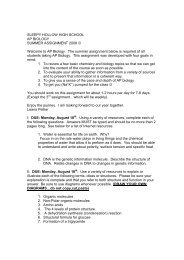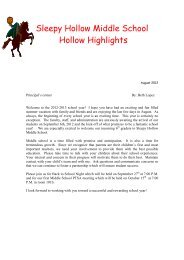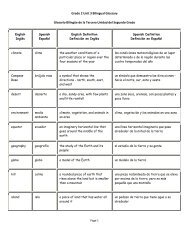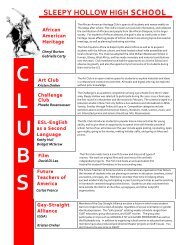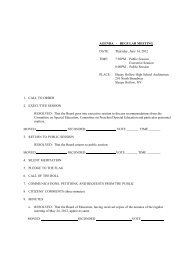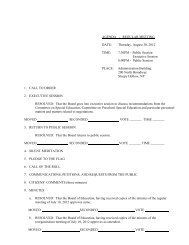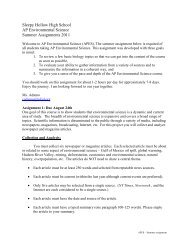Remembering Who We Are: Observations of a Southern Conservative
Remembering Who We Are: Observations of a Southern Conservative
Remembering Who We Are: Observations of a Southern Conservative
You also want an ePaper? Increase the reach of your titles
YUMPU automatically turns print PDFs into web optimized ePapers that Google loves.
363<br />
<strong>Remembering</strong> <strong>Who</strong> <strong>We</strong> <strong>Are</strong>:<br />
<strong>Observations</strong> <strong>of</strong> a <strong>Southern</strong><br />
<strong>Conservative</strong><br />
The Lincoln<br />
Legacy: A Long View<br />
With the time and manner <strong>of</strong> his death Abraham Lincoln, as leader <strong>of</strong> a Puritan<br />
people who had just won a great victory over "the forces <strong>of</strong> evil," was placed<br />
beyond the reach <strong>of</strong> ordinary historical inquiry and assessment. Through<br />
Booth's bullet he became the one who had "died to make men free," who had<br />
perished that his country's "new birth" might occur: a "second founder" who,<br />
in Ford's theater, had been transformed into an American version <strong>of</strong> the "dying<br />
god." Our common life, according to this construction, owes its continuation<br />
to the shedding <strong>of</strong> the sacred blood. Now after over a century <strong>of</strong> devotion to<br />
the myth <strong>of</strong> the "political messiah," it is still impossible for most Americans to<br />
see through and beyond the magical events <strong>of</strong> April 1865. However, Lincoln's<br />
daily purchase upon the ongoing business <strong>of</strong> the nation requires that we devise<br />
a way <strong>of</strong> setting aside the martyrdom to look behind it at Lincoln's place in<br />
the total context <strong>of</strong> American history and discover in him a major source <strong>of</strong><br />
our present confusion, our distance from the republicanism <strong>of</strong> the Fathers, the<br />
models <strong>of</strong> political conduct which we pr<strong>of</strong>ess most to admire ....<br />
Of course, nothing that we can identify as part <strong>of</strong> Lincoln's legacy belongs<br />
to him alone. In some respects the Emancipator was carried along with the<br />
tides. Yet a measure <strong>of</strong> his importance is that he was at the heart <strong>of</strong> the major<br />
political events <strong>of</strong> his era. Therefore what signifies in a final evaluation <strong>of</strong> this<br />
melancholy man is that many <strong>of</strong> these changes in the country would never<br />
have come to pass had Lincoln not pushed them forward. Or at least not come<br />
so quickly, or with such dreadful violence. I will emphasize only the events<br />
that he most certainly shaped according to his relentless will, alterations in<br />
the character <strong>of</strong> our country for which he was clearly responsible. For related<br />
developments touched by Lincoln's wand, I can have only a passing word. The<br />
major charges advanced here, if proved, are sufficient to impeach the most<br />
famous and respected <strong>of</strong> public men. More would only overdo.<br />
The first and most obvious item in my bill <strong>of</strong> particulars for indictment<br />
concerns Lincoln's dishonesty and obfuscation with respect to the nation's<br />
From <strong>Remembering</strong> <strong>Who</strong> <strong>We</strong> <strong>Are</strong>: <strong>Observations</strong> <strong>of</strong> a <strong>Southern</strong> <strong>Conservative</strong> by Melvin E. Bradford<br />
(University <strong>of</strong> Georgia Press, 1985), pp. 143-155 (notes omitted). Copyright © 1985 by University<br />
<strong>of</strong> Georgia Press. Reprinted by permission.
364 ISSUE16 / WasAbraham LincolnAmerica'sGreatestPresident?<br />
future obligations to the Negro, slave and free. It was <strong>of</strong> course an essential<br />
ingredient <strong>of</strong> Lincoln's position that he make a success at being anti-<strong>Southern</strong><br />
or antislavery without at the same time appearing to be significantly impious<br />
about the beginnings <strong>of</strong> the Republic (which was neither anti-<strong>Southern</strong> nor<br />
antislavery)-or significantly pro-Negro. He was the first Northern politician<br />
<strong>of</strong> any rank to combine these attitudes into a viable platform persona, the first<br />
to make his moral position on slavery in the South into a part <strong>of</strong> his national<br />
politics. It was a posture that enabled him to unite elements <strong>of</strong> the Northern<br />
electorate not ordinarily willing to cooperate in any political undertaking. And<br />
thus enabled him to destroy the old Democratic majority-a coalition necessary<br />
to preserving the union <strong>of</strong> the states. Then came the explosion. But this<br />
calculated posturing has had more durable consequences than secession and<br />
the Federal confiscation <strong>of</strong> property in slaves....<br />
In the nation as a whole what moves toward fruition is a train <strong>of</strong> events<br />
set in motion by the duplicitous rhetoric concerning the Negro that helped<br />
make Abraham Lincoln into our first "sectional" president. Central to this<br />
appeal is a claim to a kind <strong>of</strong> moral superiority that costs absolutely nothing<br />
in the way <strong>of</strong> conduct. Lincoln, in insisting that the Negro was included in the<br />
promise <strong>of</strong> the Declaration <strong>of</strong> Independence and that the Declaration bound<br />
his countrymen to fulfill a pledge hidden in that document, seemed clearly<br />
to point toward a radical transformation <strong>of</strong> American society. Carried within<br />
his rejection <strong>of</strong> Negro slavery as a continuing feature <strong>of</strong> the American regime,<br />
his assertion that the equality clause <strong>of</strong> the Declaration <strong>of</strong> Independence was<br />
"the father <strong>of</strong> all moral principle among us," were certain muted corollaries.<br />
Bypromising that the peculiar institution would be made to disappear if candidates<br />
for national <strong>of</strong>fice adopted the proper "moral attitude" on that subject,<br />
Lincoln recited as a litany the general terms <strong>of</strong> his regard for universal human<br />
rights. But at the same time he added certain modifications to this high doctrine:<br />
modifications required by those <strong>of</strong> his countrymen to whom he hoped<br />
to appeal, by the rigid racism <strong>of</strong> the Northern electorate, and by "what his<br />
own feelings would admit." The most important <strong>of</strong> these reservations was that<br />
none <strong>of</strong> his doctrine should apply significantly to the Negro in the North. Or,<br />
after freedom, to what he could expect in the South. It was a very broad, very<br />
general, and very abstract principle to which he made reference. Byit he could<br />
divide the sheep from the goats, the wheat from the chaff, the patriot from<br />
the conspirator. But for the Negro it provided nothing more than a technical<br />
freedom, best to be enjoyed far away. Or the valuable opportunity to "root,<br />
hog, or die." For the sake <strong>of</strong> such vapid distinctions he urged his countrymen<br />
to wade through seas <strong>of</strong> blood.<br />
To be sure, this position does not push the "feelings" <strong>of</strong> that moralist<br />
who was our sixteenth president too far from what was comfortable for him.<br />
And it goes without saying that a commitment to "natural rights" which will<br />
not challenge the BlackCodes <strong>of</strong> Illinois, which promises something like them<br />
for the freedman in the South, or else <strong>of</strong>fers him as alternative the proverbial<br />
"one-way-ticket to nowhere" is a commitment <strong>of</strong> empty words. It is only an<br />
accident <strong>of</strong> political history that the final Reconstruction settlement provided<br />
a bit more for the former slave-principally, the chance to vote Republican;
NO / Melvin E. Bradford 365<br />
and even that "right" didn't last, once a better deal was made available to his<br />
erstwhile protectors. But the point is that Lincoln's commitment was precisely<br />
<strong>of</strong> the sort that the North was ready to make-while passing legislation to<br />
restrict the flow <strong>of</strong> Negroes into its own territories, elaborating its own system<br />
<strong>of</strong> segregation by race, and exploiting black labor through its representatives<br />
in a conquered South. Lincoln's double talk left his part <strong>of</strong> the country with a<br />
durable heritage <strong>of</strong> pious self-congratulation ....<br />
The second heading in this "case against Lincoln" involves no complicated<br />
pleading. Neither will it confuse any reader who examines his record<br />
with care. For it has to do with Lincoln's political economy, his management<br />
<strong>of</strong> the commercial and business life <strong>of</strong> the part <strong>of</strong> the Republic under his<br />
authority. This material is obvious, even though it is not always connected<br />
with the presidency <strong>of</strong> Abraham Lincoln. Nevertheless, it must be developed<br />
at this point. For it leads directly into the more serious charges upon which<br />
this argument depends. It is customary to deplore the Gilded Age, the era <strong>of</strong><br />
the Great Barbecue. It is true that many <strong>of</strong> the corruptions <strong>of</strong> the Republican<br />
Era came to a head after Lincoln lay at rest in Springfield. But it is a matter <strong>of</strong><br />
fact that they began either under his direction or with his sponsorship. Military<br />
necessity, the "War for the Union," provided an excuse, an umbrella <strong>of</strong><br />
sanction, under which the essential nature <strong>of</strong> the changes being made in the<br />
relation <strong>of</strong> government to commerce could be concealed. Of his total policy<br />
the Northern historian Robert Sharkey has written, "Human ingenuity would<br />
have had difficulty in contriving a more perfect engine for class and sectional<br />
exploration, creditors finally obtaining the upper hand as opposed to debtors,<br />
and the developed East holding the whip over the underdeveloped <strong>We</strong>st and<br />
South." Until the South left the Union, until a High Whig sat in the White<br />
House, none <strong>of</strong> this return to the "energetic government" <strong>of</strong> Hamilton's design<br />
was possible. Indeed, even in the heyday <strong>of</strong> the Federalists it had never been so<br />
simple a matter to translate power into wealth. Now Lincoln could try again<br />
the internal improvements <strong>of</strong> the early days in Illinois. The difference was that<br />
this time the funding would not be restrained by political reversal or a failure<br />
<strong>of</strong> credit. For if anything fell short, Mr. Salmon P. Chase, "the foreman" <strong>of</strong> his<br />
"green printing <strong>of</strong>fice," could be instructed "to give his paper mill another<br />
turn." And the inflationary policy <strong>of</strong> rewarding the friends <strong>of</strong> the government<br />
sustained. The euphemism <strong>of</strong> our time calls this "income redistribution." But<br />
it was theft in 1864, and is theft today.<br />
A great increase in the tariff and the formation <strong>of</strong> a national banking<br />
network were, <strong>of</strong> course, the cornerstones <strong>of</strong> this great alteration in the posture<br />
<strong>of</strong> the Federal government toward the sponsorship <strong>of</strong> business. From the<br />
beginning <strong>of</strong> the Republican Party Lincoln warned his associates not to talk<br />
about their views on these subjects. Their alliance, he knew, was a negative<br />
thing: a league against the Slave Power and its Northern friends. But in private<br />
he made it clear that the hidden agenda <strong>of</strong> the Republicans would have its<br />
turn, once the stick was in their hand. In this he promised well. Between 1861<br />
and 1865, the tariff rose from 18.84 percent to 47.56 percent. And it stayed<br />
above 40 percent in all but two years <strong>of</strong> the period concluded with the election<br />
<strong>of</strong> Woodrow Wilson. Writes the Virginia historian Ludwell H. Johnson, it
366 ISSUE16 / WasAbraham Lincoln America'sGreatestPresident?<br />
would "facilitate a massive transfer <strong>of</strong> wealth, satisfying the dreariest predictions<br />
<strong>of</strong> John C. Calhoun." The new Republican system <strong>of</strong> banking (for which<br />
we should note Lincoln was directly accountable) was part <strong>of</strong> the same large<br />
design <strong>of</strong> "refounding." The National Banking Acts <strong>of</strong> 1863 and 1864, with the<br />
earlier LegalTender Act, flooded the country with $480 million <strong>of</strong> fiat money<br />
that was soon depreciated by about two-thirds in relation to specie. Then all<br />
notes but the greenback dollar were taxed out <strong>of</strong> existence, excepting only<br />
United States Treasury bonds that all banks were required to purchase if they<br />
were to have a share in the war boom. The support for these special bonds was<br />
thus the debt itself-Hamilton's old standby. Specie disappeared. Moreover,<br />
the bank laws controlled the money supply, credit, and the balance <strong>of</strong> power.<br />
New banks and credit for farms, small businesses, or small town operations<br />
were discouraged. And the Federalist model, after four score and seven years,<br />
finally achieved.<br />
Aschief executive, Lincoln naturally supported heavy taxes. Plus a scheme<br />
<strong>of</strong> tax graduation. The war was a legitimate explanation for these measures.<br />
Lincoln's participation in huge subsidies or bounties for railroads and in other<br />
legislation granting economic favors is not so readily linked to "saving the<br />
Union." All <strong>of</strong> his life Lincoln was a friend <strong>of</strong> the big corporations. He had no<br />
moral problem in signing a bill which gifted the Union Pacific Railway with<br />
a huge strip <strong>of</strong> land running across the <strong>We</strong>st and an almost unsecured loan <strong>of</strong><br />
$16,000 to $48,000 per mile <strong>of</strong> track. The final result <strong>of</strong> this bill was the Credit<br />
Mobilier scandal. With other laws favoring land speculation it helped to negate<br />
the seemingly noble promise <strong>of</strong> the Homestead Act <strong>of</strong> 1862-under which less<br />
than 19 percent <strong>of</strong> the open lands settled between 1860 and 1900 went to legitimate<br />
homesteaders. The Northern policy <strong>of</strong> importing immigrants with the<br />
promise <strong>of</strong> this land, only to force them into the ranks <strong>of</strong> General Grant's meatgrinder<br />
or into near slavery in the cities <strong>of</strong> the East, requires little comment. Nor<br />
need we belabor the rotten army contracts given to politically faithful crooks.<br />
Nor the massive thefts by law performed during the war in the South. More<br />
significant is Lincoln's openly disgraceful policy <strong>of</strong> allowing special cronies and<br />
favorites <strong>of</strong> his friends to trade in <strong>Southern</strong> cotton-even with "the enemy"<br />
across the line-and his calculated use <strong>of</strong> the patronage and the pork barrel.<br />
Between 1860 and 1880, the Republicans spent almost $10 million breathing<br />
life into state and local Republican organizations. Lincoln pointed them down<br />
that road. There can be no doubt <strong>of</strong> his responsibility for the depressing spectacle<br />
<strong>of</strong> greed and peculation concerning which so many loyal Northern men<br />
<strong>of</strong> the day spoke with sorrow, disappointment, and outrage ....<br />
A large part <strong>of</strong> the complaint against Lincoln as a political precedent for<br />
later declensions from the example <strong>of</strong> the Fathers has to do with his expansion<br />
<strong>of</strong> the powers <strong>of</strong> the presidency and his alteration <strong>of</strong> the basis for the Federal<br />
Union. With reference to his role in changing the <strong>of</strong>fice <strong>of</strong> chief magistrate<br />
from what it had been under his predecessors, it is important to remember<br />
that he defined himself through the war powers that belonged to his post.<br />
In this way Lincoln could pr<strong>of</strong>ess allegiance to the Whig ideal <strong>of</strong> the modest,<br />
self-effacing leader, the antitype <strong>of</strong> Andrew Jackson, and, in his capacity as<br />
Commander-in-Chief, do whatever he wished. That is, if he could do it in
NO / Melvin E. Bradford 367<br />
the name <strong>of</strong> preserving the Union. As Clinton Rossiter has stated, Lincoln<br />
believed there were "no limits" to his powers if he exercised them in that "holy<br />
cause." Gottfried Dietze compares Lincoln in this role to the Committee <strong>of</strong><br />
Public Safety as it operated in the French Revolution. Except for the absence<br />
<strong>of</strong> mass executions, the results were similar. War is <strong>of</strong> course the occasion for<br />
concentration <strong>of</strong> power and the limitation <strong>of</strong> liberties within any nation. But<br />
an internal war, a war between states in a union <strong>of</strong> states, is not like a war to<br />
repel invasion or to acquire territory. For it is an extension into violence <strong>of</strong> a<br />
domestic political difference. And it is thus subject to extraordinary abuses <strong>of</strong><br />
authority-confusions or conflations <strong>of</strong> purpose which convert the effort to<br />
win the war into an effort to effect even larger, essentially political changes<br />
in the structure <strong>of</strong> government. War, in these terms, is not only an engine for<br />
preserving the Union; it is also an instrument for transforming its nature. But<br />
without overdeveloping this structure <strong>of</strong> theory, let us shore it up with specific<br />
instances <strong>of</strong> presidential misconduct by Lincoln: abuses that mark him<br />
as our first imperial president. Lincoln began his tenure as a dictator when<br />
between April 12 and July 4 <strong>of</strong> 1861, without interference from Congress,<br />
he summoned militia, spent millions, suspended law, authorized recruiting,<br />
decreed a blockade, defied the Supreme Court, and pledged the nation's credit.<br />
In the following months and years he created units <strong>of</strong> government not known<br />
to the Constitution and <strong>of</strong>ficers to rule over them in "conquered" sections<br />
<strong>of</strong> the South, seized property throughout both sections, arrested upwards <strong>of</strong><br />
twenty thousand <strong>of</strong> his political enemies and confined them without trial in a<br />
Northern "Gulag," closed over three hundred newspapers critical <strong>of</strong> his policy,<br />
imported an army <strong>of</strong> foreign mercenaries (<strong>of</strong> perhaps five hundred thousand<br />
men), interrupted the assembly <strong>of</strong> duly elected legislatures and employed the<br />
Federal hosts to secure his own reelection-in a contest where about thirtyeight<br />
thousand votes, if shifted, might have produced an armistice and a negotiated<br />
peace under a President McClellan. To the same end he created a state in<br />
<strong>We</strong>st Virginia, arguing <strong>of</strong> this blatant violation <strong>of</strong> the explicit provisions <strong>of</strong> the<br />
Constitution that it was "expedient." But the worst <strong>of</strong> this bold and ruthless<br />
dealing (and I have given but a very selective list <strong>of</strong> Lincoln's "high crimes")<br />
has to do with his role as military leader per se: as the commander and selector<br />
<strong>of</strong> Northern generals, chief commissary <strong>of</strong> the Federal forces, and head <strong>of</strong><br />
government in dealing with the leaders <strong>of</strong> an opposing power. In this role the<br />
image <strong>of</strong> Lincoln grows to be very dark-indeed, almost sinister.<br />
The worst that we may say <strong>of</strong> Lincoln is that he led the North in war<br />
so as to put the domestic political priorities <strong>of</strong> his political machine ahead<br />
<strong>of</strong> the lives and the well-being <strong>of</strong> his soldiers in the field. The appointment<br />
<strong>of</strong> the venal Simon Cameron <strong>of</strong> Pennsylvania as his secretary <strong>of</strong> war, and <strong>of</strong><br />
lesser hacks and rascals to direct the victualing <strong>of</strong> Federal armies, was part <strong>of</strong><br />
this malfeasance. By breaking up their bodies, the locust hoard <strong>of</strong> contractors<br />
even found a pr<strong>of</strong>it in the Union dead. And better money still in the living.<br />
They made <strong>of</strong> Lincoln (who winked at their activities) an accessory to lost<br />
horses, rotten meat, and worthless guns. But all such mendacity was nothing<br />
in comparison to the price in blood paid for Lincoln's attempts to give<br />
the nation a genuine Republican hero. He had a problem with this project
368 ISSUE16/ Was Abraham Lincoln America's Greatest President?<br />
throughout the entire course <strong>of</strong> the war. That is, until Grant and Sherman<br />
"converted" to radicalism. Prior to their emergence all <strong>of</strong> Lincoln's "loyal"<br />
generals disapproved <strong>of</strong> either his politics or <strong>of</strong> his character. These, as with<br />
McClellan, he could use and discharge at will. Or demote to minor tasks. One<br />
thinks immediately <strong>of</strong> George G. Meade-who defeated Lee at Gettysburg, and<br />
yet made the mistake <strong>of</strong> defining himself as the defender <strong>of</strong> a separate Northern<br />
nation from whose soil he would drive a foreign <strong>Southern</strong> "invader." Or<br />
<strong>of</strong> Fitz John Porter, William B. Franklin, and Don Carlos Buell-all scapegoats<br />
thrown by Lincoln to the radical wolves. In place <strong>of</strong> these heterodox pr<strong>of</strong>essionals,<br />
Lincoln assigned such champions <strong>of</strong> the "new freedom" as Nathaniel<br />
P. ("Commissary") Banks, Benjamin F. ("Beast") Butler, John C. Fremont, and<br />
John A. McClernand. Speaking in summary despair <strong>of</strong> these appointments<br />
(and adding to my list, Franz Sigel and Lew Wallace), General Henry Halleck,<br />
Lincoln's chief-<strong>of</strong>-staff, declared that they were "little better than murder." Yet<br />
in the East, with the Army <strong>of</strong> the Potomac, Lincoln make promotions even<br />
more difficult to defend, placing not special projects, divisions, and brigades<br />
but entire commands under the authority <strong>of</strong> such "right thinking" incompetents<br />
as John Pope (son <strong>of</strong> an old crony in Illinois) and "Fighting Joe" Hooker.<br />
Or with that "tame" Democrat and late favorite <strong>of</strong> the radicals, Ambrose E.<br />
Burnside. Thousands <strong>of</strong> Northern boys lost their lives in order that the Republican<br />
Party might experience rejuvenation, to serve its partisan goals. And<br />
those were "party supremacy within a Northern dominated Union." A Democratic<br />
"man-on-horseback" could not serve those ends, however faithful to<br />
"the Constitution as it is, and the Union as it was" (the motto <strong>of</strong> the Democrats)<br />
they might be. For neither <strong>of</strong> these commitments promised a Republican<br />
hegemony. To provide for his faction both security and continuity in <strong>of</strong>fice,<br />
Lincoln sounded out his commanders in correspondence (much <strong>of</strong> which still<br />
survives), suborned their military integrity, and employed their focus in purely<br />
political operation. Writes Johnson:<br />
Although extreme measures were most common in the border states,<br />
they were <strong>of</strong>ten used elsewhere too. By extreme measures is meant the<br />
arrest <strong>of</strong> anti-Republican candidates and voters, driving anti-Republican<br />
voters from the polls or forcing them to vote the Republican ticket,<br />
preventing opposition parties from holding meetings, removing names<br />
from ballots, and so forth. These methods were employed in national,<br />
state and local elections. Not only did the army interfere by force, it was<br />
used to supply votes. Soldiers whose states did not allow absentee voting<br />
were sent home by order <strong>of</strong> the President to swell the Republican totals.<br />
When voting in the field was used, Democratic commissioners carrying<br />
ballots to soldiers from their state were ... unceremoniously thrown<br />
into prison, while Republican agents were <strong>of</strong>fered every assistance.<br />
Votes <strong>of</strong> Democratic soldiers were sometimes discarded as defective,<br />
replaced by Republican ballots, or simply not counted.<br />
All Lincoln asked <strong>of</strong> the ordinary Billy Yank was that he be prepared<br />
to give himself up to no real purpose-at least until Father Abraham found<br />
a general with the proper moral and political credentials to lead him on to
NO / Melvin E. Bradford 369<br />
Richmond. How this part <strong>of</strong> Lincoln's career can be reconciled to the myth <strong>of</strong><br />
the "suffering savior" I cannot imagine.<br />
<strong>We</strong> might dwell for some time on what injury Lincoln did to the dignity<br />
<strong>of</strong> his <strong>of</strong>fice through the methods he employed in prosecuting the war. It was<br />
no small thing to disavow the ancient Christian code <strong>of</strong> "limited war," as did<br />
his minions, acting in his name. However, it is enough in this connection to<br />
remember his policy <strong>of</strong> denying medicines to the South, even for the sake<br />
<strong>of</strong> Northern prisoners held behind the lines. <strong>We</strong> can imagine what a modern<br />
"war crimes" tribunal would do with that decision. There may have been<br />
practicality in such inhumane decisions. Practicality indeed! AsCharles Francis<br />
Adams, Lincoln's ambassador to the Court <strong>of</strong> St. James and the scion <strong>of</strong> the<br />
most notable family in the North, wrote in his diary <strong>of</strong> his leader, the "President<br />
and his chief advisers are not without the spirit <strong>of</strong> the serpent mixed in<br />
with their wisdom." And he knew where<strong>of</strong> he spoke. For practical politics, the<br />
necessities <strong>of</strong> the campaign <strong>of</strong> 1864, had led Lincoln and Seward to a decision<br />
far more serious than unethical practices against prisoners and civilians in the<br />
South. I speak <strong>of</strong> the rejection by the Lincoln administration <strong>of</strong> peace feelers<br />
authorized by the Confederate government in Richmond: feelers that met<br />
Lincoln's announced terms for an end to the Federal invasion <strong>of</strong> the South.<br />
The emissary in this negotiation was sponsored by Charles Francis Adams. He<br />
was a Tennessean living in France, one Thomas Yeatman. After arriving in<br />
the United States, he was swiftly deported by direct order <strong>of</strong> the government<br />
before he could properly explore the possibility <strong>of</strong> an armistice on the conditions<br />
<strong>of</strong> reunion and an end to slavery. Lincoln sought these goals, but only<br />
on his terms. And in his own time. He wanted total victory. And he needed a<br />
still-resisting, impenitent Confederacy to justify his re-election. <strong>We</strong> can only<br />
speculate as to why President Davis allowed the Yeatman mission. <strong>We</strong> know<br />
that he expected little <strong>of</strong> such peace feelers. (There were many in the last stages<br />
<strong>of</strong> the conflict.) He knew his enemy too well to expect anything but subjection,<br />
however benign the rhetoric used to disguise its rigor. Adams's peace<br />
plan was perhaps impossible, even if his superiors in Washington had behaved<br />
in good faith. The point is that none <strong>of</strong> the peace moves <strong>of</strong> 1864 was given<br />
any chance <strong>of</strong> success. Over one hundred thousand Americans may have died<br />
because <strong>of</strong> the Rail-Splitter's rejection <strong>of</strong> an inexpedient peace. Yetwe have still<br />
not touched upon the most serious <strong>of</strong> Lincoln's violations <strong>of</strong> the Presidential<br />
responsibility. I speak, finally, <strong>of</strong> his role in bringing on the War Between the<br />
States.<br />
There is, we should recall, a great body <strong>of</strong> scholarly argument concerning<br />
Lincoln's intentions in 1860 and early 1861. A respectable portion <strong>of</strong> this<br />
work comes to the conclusion that the first Republican president expected<br />
a "tug," a "crisis," to follow his election. And then, once secession had<br />
occurred, also expected to put it down swiftly with a combination <strong>of</strong> persuasion,<br />
force, and <strong>Southern</strong> loyalty to the Union. The last <strong>of</strong> these, it is agreed,<br />
he completely overestimated. In a similar fashion he exaggerated the force <strong>of</strong><br />
<strong>Southern</strong> "realism," the region's capacity to act in its own pecuniary interest.<br />
The authority on Lincoln's political economy has remarked that the Illinois<br />
lawyer-politician and old line Whig always made the mistake <strong>of</strong> explaining in
370 ISSUE16/ WasAbraham Lincoln America'sGreatestPresident?<br />
simple economic terms the South's hostile reaction to anti-slavery proposals.<br />
To that blunder he added the related mistake <strong>of</strong> attempting to end the "rebellion"<br />
with the same sort <strong>of</strong> simplistic appeals to the prospect <strong>of</strong> riches. Or with<br />
fear <strong>of</strong> a servile insurrection brought on by his greatest "war measure," the<br />
emancipation <strong>of</strong> slaves behind <strong>Southern</strong> lines, beyond his control. A full-scale<br />
<strong>Southern</strong> revolution, a revolution <strong>of</strong> all classes <strong>of</strong> men against the way he and<br />
some <strong>of</strong> his supporters thought, was beyond his imagination. There was no<br />
"policy" in such extravagant behavior, no human nature as he perceived it.<br />
Therefore, on the basis <strong>of</strong> my understanding <strong>of</strong> his overall career, I am compelled<br />
to agree with Charles W. Ramsdell concerning Lincoln and his war.<br />
Though he was no sadist and no warmonger, and though he got for his pains<br />
much more <strong>of</strong> a conflict than he had in mind, Lincoln hoped for an "insurrection"<br />
<strong>of</strong> some sort-an "uprising" he could use.<br />
The "rational" transformation <strong>of</strong> our form <strong>of</strong> government which he had<br />
first predicted in the "Springfield Lyceum Speech" required some kind <strong>of</strong> passionate<br />
disorder to justify the enforcement <strong>of</strong> a new Federalism. And needed<br />
also for the voting representatives <strong>of</strong> the South to be out <strong>of</strong> their seats in the<br />
Congress. It is out <strong>of</strong> keeping with his total performance as a public man and<br />
in contradiction <strong>of</strong> his campaigning after 1854 not to believe that Lincoln<br />
hoped for a <strong>Southern</strong> attack on Fort Sumter. As he told his old friend Senator<br />
Orville H. Browning <strong>of</strong> Illinois: "The plan succeeded. They attacked Sumter-it<br />
fell, and thus did more service than it otherwise could." And to others he<br />
wrote or spoke to the same effect. If the Confederacy's <strong>of</strong>fer <strong>of</strong> money for<br />
Federal property were made known in the North and business relations <strong>of</strong> the<br />
sections remained unaffected, if the Mississippi remained open to Northern<br />
shipping, there would be no support for "restoring" the Union on a basis <strong>of</strong><br />
force. Americans were in the habit <strong>of</strong> thinking <strong>of</strong> the unity <strong>of</strong> the nation as a<br />
reflex <strong>of</strong> their agreement in the Constitution, <strong>of</strong> law as limit on government<br />
and on the authority <strong>of</strong> temporary majorities, and <strong>of</strong> revisions in law as the<br />
product <strong>of</strong> the ordinary course <strong>of</strong> push and pull within a pluralistic society,<br />
not as a response to the extralegal authority <strong>of</strong> some admirable abstraction<br />
like equality. In other words, they thought <strong>of</strong> the country as being defined by<br />
the way in which we conducted our political business, not by where we were<br />
trying to go in a body. Though once a disciple <strong>of</strong> Henry Clay, Lincoln changed<br />
the basis <strong>of</strong> our common bond away from the doctrine <strong>of</strong> his mentor, away<br />
from the patterns <strong>of</strong> compromise and dialectic <strong>of</strong> interests and values under a<br />
limited, Federal sovereignty with which we as a people began our adventure<br />
with the Great Compromise <strong>of</strong> 1787-1788. The nature <strong>of</strong> the Union left to us<br />
by Lincoln is thus always at stake in every major election, in every refinement<br />
in our civil theology; the Constitution is still to be defined by the latest wave<br />
<strong>of</strong> big ideas, the most recent mass emotion. Writes Dietze:<br />
Concentrations <strong>of</strong> power in the national and executive branches <strong>of</strong><br />
government, brought about by Lincoln in the name <strong>of</strong> the people,<br />
wereprocessesthat conceivably complemented each other to the detriment<br />
<strong>of</strong> free government. Lincoln's administration thus opened the<br />
way for the development <strong>of</strong> an omnipotent national executive who as
NO / Melvin E. Bradford 371<br />
a spokesman for the people might consider himself entitled to do whatever<br />
he felt was good for the Nation, irrespective <strong>of</strong> the interests and<br />
rights <strong>of</strong> states, Cungress, the judiciary, and the individual. ...<br />
But in my opinion the capstone <strong>of</strong> this case against Lincoln ... is what<br />
he has done to the language <strong>of</strong> American political discourse that makes it so<br />
difficult for us to reverse the ill effects <strong>of</strong> trends he set in motion with his executive<br />
fiat. When I say that Lincoln was our first Puritan president, I am chiefly<br />
referring to a distinction <strong>of</strong> style, to his habit <strong>of</strong> wrapping up his policy in the<br />
idiom <strong>of</strong> Holy Scripture, concealing within the Trojan horse <strong>of</strong> his gasconade<br />
and moral superiority an agenda that would never have been approved if presented<br />
in any other form. It is this rhetoric in particular, a rhetoric confirmed<br />
in its authority by his martyrdom, that is enshrined in the iconography <strong>of</strong><br />
the Lincoln myth preserved against examination by monuments such as the<br />
Lincoln Memorial, where his oversized likeness is elevated above us like that<br />
<strong>of</strong> a deified Roman emperor. ...



